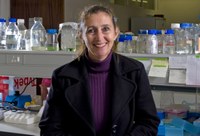 According to the World Health Organization, more than one-third of the world's population may carry the TB bacillus. Once thought by the global health community to be a disease well on its way to being controlled, TB has once again become a global health threat.
According to the World Health Organization, more than one-third of the world's population may carry the TB bacillus. Once thought by the global health community to be a disease well on its way to being controlled, TB has once again become a global health threat.
Valerie Mizrahi's Molecular Mycobacteriology Research Unit (MMRU) at the University of the Witwatersrand in Johannesburg, South Africa, is conducting cutting-edge research to combat TB. The unit was established in 2000 "to develop and apply genetic tools to identify, validate and characterize novel drug targets and vaccine candidates for TB".
"Multidrug-resistant tuberculosis (MDR-TB) does not respond to the standard treatments using first- and second-line drugs," Mizrahi explains. "During the infectious process, the DNA of Mycobacterium tuberculosis undergoes random mutations that shelter it from the host's immune defense." Mizrahi and her colleagues are investigating the molecular mechanisms that lead to drug-resistant strains of M. tuberculosis.
Another critical issue is the mechanism that allows M. tuberculosis to lie dormant in the host's organism for decades after infection only to have the disease symptoms suddenly flare up. To help detect which parts in the genetic makeup of the bacterium are responsible for this phenomenon, MMRU staff have produced a library of mutant strains of M. tuberculosis lacking those genes which in other bacteria are implicated in the disease's resurgence.
"Until we are better able to understand this process and find ways to kill the bacilli in latently infected individuals," Mizrahi says, "TB will remain a problem because it will continue to arise within the massive reservoir of latently infected people in the world today."
Following her postdoc at Pennsylvania State University and a stint in the private sector with SmithKline, Mizrahi was poised to pursue a career outside Africa. Instead, she chose to return home to work on health problems of critical importance to the continent. As a native African – Mizrahi was born in Harare, Zimbabwe, and earned her PhD in chemistry at the University of Cape Town, South Africa – she is keenly aware of the damage inflicted by TB to lives and economies of sub-Saharan Africa.
"TB is a disease that plagues poor countries, worsening an already dismal situation. One quarter of the global TB burden is rooted in Africa," Mizrahi points out. "Progress in combating TB not only saves lives; it also provides hope for a better future for all of Africa."
To download the complete article, click here: Targeting TB in South Africa (PDF, 320 K)

